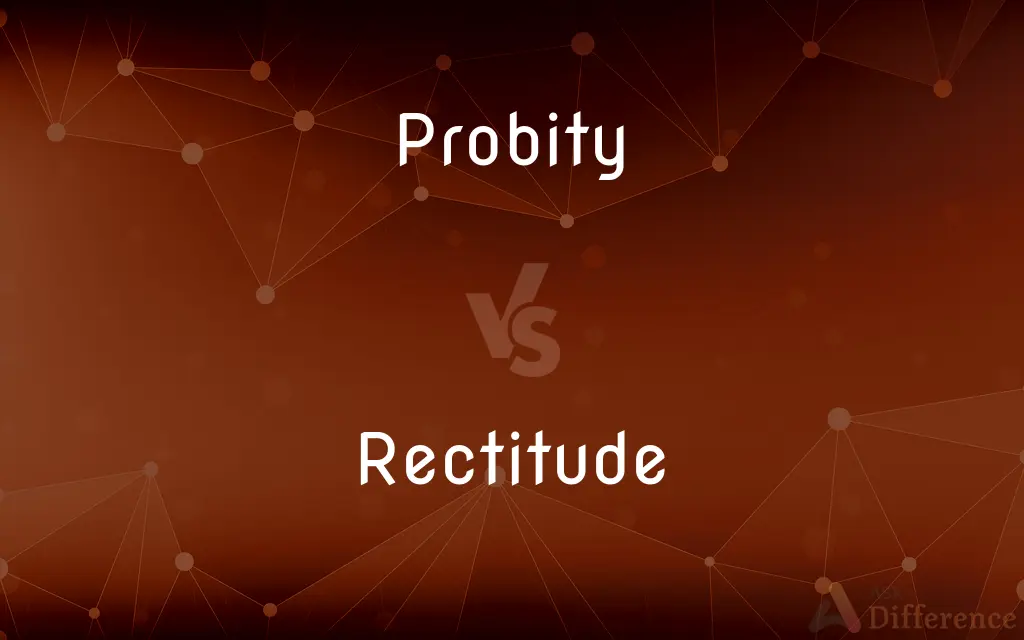Probity vs. Rectitude — What's the Difference?
By Maham Liaqat & Fiza Rafique — Updated on April 7, 2024
Probity refers to honesty and integrity in one’s actions and character, often associated with moral uprightness in financial dealings, while rectitude denotes a broader moral righteousness, encompassing ethical conduct across all aspects of life.

Difference Between Probity and Rectitude
Table of Contents
ADVERTISEMENT
Key Differences
Probity is a quality that emphasizes honesty and integrity, particularly in financial dealings and professional conduct. It suggests a steadfast adherence to ethical practices and principles, ensuring transparency and trustworthiness. On the other hand, rectitude refers to a more encompassing moral righteousness, implying an adherence to ethical and moral principles in all actions and decisions. It involves a commitment to do what is morally right, regardless of the context.
While probity often comes into play in contexts where financial integrity, honesty in transactions, and adherence to legal and ethical standards are paramount, rectitude spans a broader spectrum of moral and ethical behavior. Rectitude is about having a strong moral compass that guides all personal and professional actions, reflecting a character that consistently aligns with virtuous principles.
Probity is highly valued in sectors where trust and honesty are foundational, such as banking, law, and public service. It’s about demonstrating unwavering integrity in dealings that might otherwise be susceptible to corruption or dishonesty. Conversely, rectitude is a quality that applies universally, influencing one’s approach to life and interactions with others, embodying a holistic commitment to moral excellence.
In essence, while both qualities are interrelated and overlap in their emphasis on ethical behavior, probity is often viewed through a narrower lens, focusing on honesty and integrity in specific contexts. Rectitude, however, is seen as a broader ethical and moral stance that affects all dimensions of life, advocating for a righteous way of living that upholds moral values universally.
The distinction between probity and rectitude can also be understood in terms of scope and application. Probity is especially relevant in scenarios where the integrity of actions is scrutinized, such as in professional or financial contexts. Rectitude, by contrast, is concerned with moral and ethical uprightness in a wider sense, influencing a person’s conduct in both public and private spheres.
ADVERTISEMENT
Comparison Chart
Definition
Honesty and integrity, especially in financial and professional contexts
Moral righteousness, ethical conduct in all aspects of life
Scope
Often associated with financial dealings and professional integrity
Encompasses ethical behavior in all actions and decisions
Key Contexts
Banking, law, public service
All personal and professional spheres
Value
Trustworthiness, transparency
Moral excellence, adherence to virtuous principles
Application
Specific contexts requiring honesty and integrity
Universal application in ethical and moral behaviors
Compare with Definitions
Probity
Adherence to the highest principles and ideals, especially in professional conduct.
The accountant's probity was evident in her transparent financial reporting.
Rectitude
Commitment to moral and ethical principles.
His rectitude was evident in his fair treatment of all employees.
Probity
Integrity and uprightness in business transactions.
His probity in negotiations earned him widespread respect.
Rectitude
Morally correct behavior or thinking; righteousness.
Her rectitude in all matters inspired those around her.
Probity
Ensuring transparency and ethical behavior in financial dealings.
The firm's probity in financial disclosures fostered investor confidence.
Rectitude
Upholding moral values universally.
She lived her life with a sense of rectitude, always striving to do what was right.
Probity
The quality of having strong moral principles; honesty.
Probity in public office is essential for maintaining public trust.
Rectitude
Acting with ethical and moral integrity in all aspects of life.
Rectitude guided his decisions, both personal and professional.
Probity
Uncompromising honesty in professional settings.
The lawyer's probity was recognized by her peers and clients alike.
Rectitude
The quality of being honest and morally correct.
He was known for his rectitude and integrity.
Probity
Complete and confirmed integrity; uprightness
"He was a gentlemanly Georgian, a person of early American probity" (Mary McGrory).
Rectitude
Moral uprightness; righteousness.
Probity
Integrity, especially of the quality of having strong moral principles; decency and honesty.
Rectitude
The quality or condition of being correct in judgment.
Probity
Tried virtue or integrity; approved moral excellence; honesty; rectitude; uprightness.
Rectitude
The quality of being straight.
Probity
Complete and confirmed integrity
Rectitude
Straightness; the state or quality of having a constant direction and not being crooked or bent.
Rectitude
The fact or quality of being right or correct; correctness of opinion or judgement.
Rectitude
Conformity to the rules prescribed for moral conduct; (moral) uprightness, virtue.
Rectitude
Straightness.
Rectitude
Rightness of principle or practice; exact conformity to truth, or to the rules prescribed for moral conduct, either by divine or human laws; uprightness of mind; uprightness; integrity; honesty; justice.
Rectitude
Right judgment.
Rectitude
Uprightness as a consequence of being honorable and honest
Common Curiosities
How does rectitude differ from probity?
Rectitude is a broader concept that denotes moral righteousness and ethical conduct in all aspects of life, while probity focuses more specifically on honesty and integrity, often in financial and professional dealings.
Can someone exhibit probity but lack rectitude?
While probity and rectitude are closely related, it's conceivable for someone to demonstrate honesty in professional matters (probity) yet not fully adhere to ethical principles in personal life, suggesting a potential gap in rectitude.
Why is probity important in professional settings?
Probity is crucial in professional settings as it builds trust, ensures transparency, and maintains the integrity of financial and business transactions, which are foundational to ethical practices and legal compliance.
Is rectitude applicable in today's society?
Yes, rectitude is highly relevant in today’s society as it promotes ethical behavior, fairness, and integrity, which are essential for building trust and fostering healthy relationships and communities.
How are probity and rectitude measured?
Probity and rectitude are often measured by observing an individual’s actions and decisions, looking for consistency with ethical principles, honesty, and moral integrity across various contexts.
What is probity?
Probity is the quality of being honest and having strong moral principles, especially in professional and financial contexts.
Do probity and rectitude only apply to individuals?
While often discussed in the context of individual behavior, probity and rectitude can also apply to organizations and institutions, reflecting their commitment to ethical standards and moral conduct.
How can one develop rectitude?
Developing rectitude involves cultivating a strong moral compass, consistently applying ethical principles in decision-making, and striving for moral excellence in both personal and professional life.
What role does culture play in defining probity and rectitude?
Culture can influence the perception and expression of probity and rectitude by shaping moral values, ethical norms, and expectations of honesty and integrity within a society.
Can rectitude be taught?
Rectitude can be encouraged and developed through education, mentoring, and the cultivation of ethical values, but it ultimately depends on individual choice and commitment to moral principles.
Share Your Discovery

Previous Comparison
Edition vs. Version
Next Comparison
Advancement vs. EnhancementAuthor Spotlight
Written by
Maham LiaqatCo-written by
Fiza RafiqueFiza Rafique is a skilled content writer at AskDifference.com, where she meticulously refines and enhances written pieces. Drawing from her vast editorial expertise, Fiza ensures clarity, accuracy, and precision in every article. Passionate about language, she continually seeks to elevate the quality of content for readers worldwide.
















































